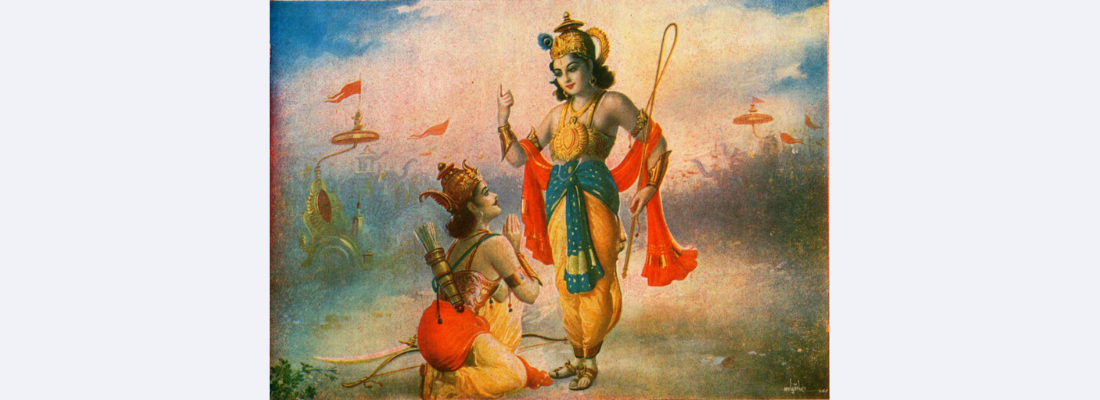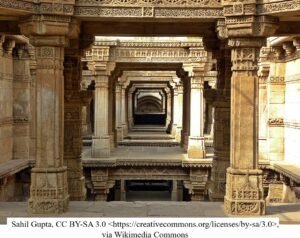मोक्ष सन्यास योग Moksha Sanyaas Yoga
The Bhagwad Gita
Chapter 18
Sanjay Mehta
मोक्ष सन्यास योग
Moksha Sanyaas Yoga
This chapter is a summary of Bhagwad Gita.
First six chapters talk about who am I. I am the Self and not the body, the mind, or the intellect. We have wrongly identified ourselves with Body-Mind complex. Because of this misapprehension, we are not able to see the Self (Atma). This portion also describes Karma Yog as means of purification. The sixth chapter describes Dhyaan Yog.
The second of six chapters explain evolution and nature of human being. Temperamental qualities and multitude of personalities are analysed and explained. Additionally, path is shown to transcend these temperaments by using the positive qualities, how one can raise oneself spiritually through Gyan Yog is explained. How to detach from the sensed of “I” and “My” is explained in this final Chapter called Yog of liberation (Moksha) through renunciation (Sanyaas).
The chapter starts with Arjun’ question:
सन्न्यासस्य महाबाहो तत्त्वमिच्छामि वेदितुम,
त्यागस्य छ हृषिकेश पृथक्केशिनिषूदन || १ ||
Sanyaasasya mahaabaaho tatvamichchhaami veditum
Tyaagasya chh Hrishikesh pruthakkeshinishoodana ||1||
I wish to know the true nature of Sanyaas and of Tyaag distinctly.
Bhagwan said:
काम्यानां कर्मनां न्यासं सन्यासं कवयो विदु:,
सर्वकर्मफलत्यागं प्राहुस्त्यागं विचक्षणा: || २ ||
Kaamyaanaam karmanaam nyaasam sanyaasam kavayo viduh
Sarvakarmaphaltyaagam prahastyaagam vichakshanaah
Sanyaas – renunciation without the spirit of Tyaag or relinquishment if incomplete. Sanyaas is an end or goal, Tyaag is a means or process.
Giving up actions which are motivated by desire is called Sanyaas and giving up fruits of all actions is declared as Tyaag.
Certain actions are our responsibility, our Swadharma. We have responsibility to family, to society, to nation etc. We should never give up these responsibilities.
एतान्यपि तु कर्मानि सङ्गं त्यक्त्वा फलानी च ,
कर्तव्यानीति मे पार्थ निश्चितं मतमुत्तमम || ६ ||
Etaanyapi tu karmaani sangan tyaktvaa phalaani ch
Kartavyaaneeti me Parth nishchitam matamuttamam
These actions should be performed as Swadharma by relinquishing attachment to the fruits of action. This is my firm and highest conviction.
श्रेयान्स्वधर्मो विगुण: परधर्मात्स्वनुष्ठितात ,
स्वभावनियतं कर्मा कुर्वन्नाप्नोति किल्बिषम || ४७ ||
Shreyaanswadharmo vigunah pardharmaatsvanushthitaat
Swabhaavniyatam karma kurvannapnooti kilbisham ||47||
One’s own duty even though seemingly imperfect in performance, is better than another’s well-accomplished duty. Doing the duty, determined by one’s in-born nature, one does not incur guilt. Even though you are not perfect now, at the right time, you can make it perfect.
Essence
“श्रेयान्स्वधर्मो विगुण: परधर्मात्स्वनुष्ठितात”
One’s Swadharma, even though seemingly imperfect in performance, is better than another’s well-accomplished duty.
Bhagwan said to Arjuna that one must perform karma, if performed well in the spirit of Swadharma, it contributes to the purification of the mind.
Bhagwan describes a method called ‘Sharanaagati – Devotion of Bhagwan,’ which helps make Karma effective without being entangled in Karma cycle.
सर्वधर्मान्परित्यज मामेकं शरनं व्रज ,
अहं त्वां सर्वपापेभ्यो मोक्षयिष्यामी माँ शुच: || ६६ ||
Sarvadharmaanparityajya maamekam sharanam vraj
Aham tvaam sarvapaapebhyoo mokshayishyaami maa shuchah ||66||
Convert Karma into an offering to the Bhagwan. Having renounced all actions, seek me (Bhagwan), the nondual one as your shelter. I shall guide you to the liberation from all the shortcomings. Do not lament.
‘Sharanagati’ – Devotion to Bhagwan helps one melt the ego (deha abhimaan) which in turn results in ‘Karma phala tyaaga’ temperament.
After more than an hour of dialogue and discourse, Shri Krishna is curious to find Arjun’s comprehension of his teaching (Bhagwad Gita).
Bhagwan asked:
कच्चिदेतच्छृतं पार्थ त्वयै काग्रेण चेतसा,
कच्चिदज्ञानसम्मोह: प्रनष्टस्ते धनंजय || ७२ ||
Oh Arjun! Have you listened to the teaching with one-pointed mind? Has your delusion born out of ignorance gone completely?
Like a devoted and satisfied disciple Arjun said:
नष्टो मोहः स्मृतिर्लब्धा त्वत्प्रसादान्मयाच्युत,
स्वभावनियतं कर्मा कुर्वन्नाप्नोति किल्बिषम || ७३ ||
Nashto mohah smrutirlabdhaa tvatprasaadaanmyaachyut
Sthitoosmi gatsandehah karishye vachanam tav ||73||
My delusion (moha) is gone,
I have regained my memory/knowledge (smriti),
I remain free from all doubts (sandeha),
Now, I will act (perform karma for Loka Sangrah – greater good) according to your instructions.
Sanjay concludes the whole Bhagwad Gita dialogue in the last verse:
यत्र योगेश्वर: कृष्णो यत्र पार्थो धनुर्धर:,
तत्र श्रीर्विजयो भूतिध्रुवा नीतिर्मतिर्मम || ७८ ||
Yatra Yogeshwarah krishno yatra partho dhanurdharah
Tatra shrirvijayo bhootidhruvaa neetirmatirmam
Wherever there is Shri Krishna, the Master of Yog, and wherever there is Arjun, the Master of Archery, there will be permanent wealth, victory, well-being, and unfailing justice. This is my firm conviction.
ॐ पूर्णमद: पूर्णमिदम पूर्णात्पूर्णमुदच्यते
पूर्णस्य पूर्णमादाय पूर्णमेवावशिष्यते ॥
ॐ शान्तिः शान्तिः शान्तिः ॥
Essence
“यत्र योगेश्वर: कृष्ण:, तत्र ध्रुवा नीतिः”
Wherever there is Yogeshwar Krishna there will be unfailing justice.
Image Credit
https://upload.wikimedia.org/wikipedia/commons/b/b0/Krishna_tells_Gita_to_Arjun.jpg
-
The Bhagwad Gita — Essence
Essence The Bhagwad Gita Essence Sanjay Mehta Bhagwad Gita is…
-
The Bhagwad Gita — Chapter 18
मोक्ष सन्यास योग Moksha Sanyaas Yoga The Bhagwad Gita Chapter…
-
The Bhagwad Gita — Chapter 17
The Bhagwad Gita Chapter 17 Sanjay Mehta श्रद्धा त्रय विभाग…


